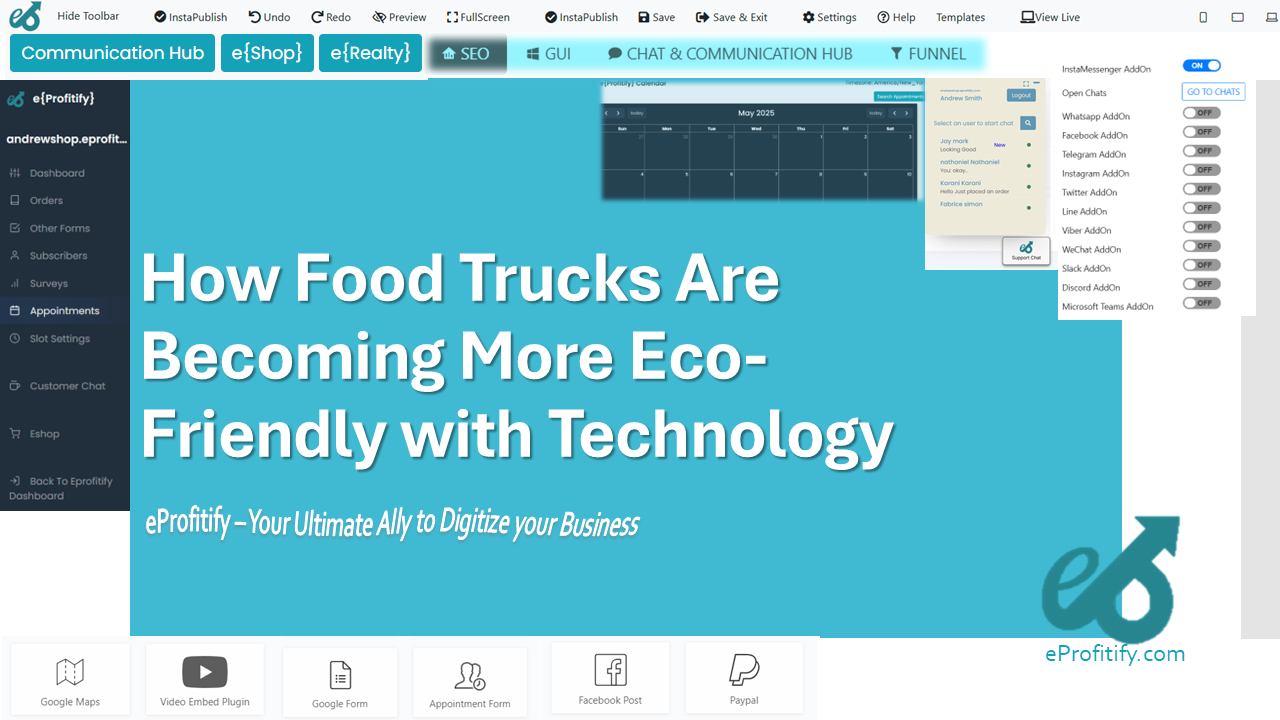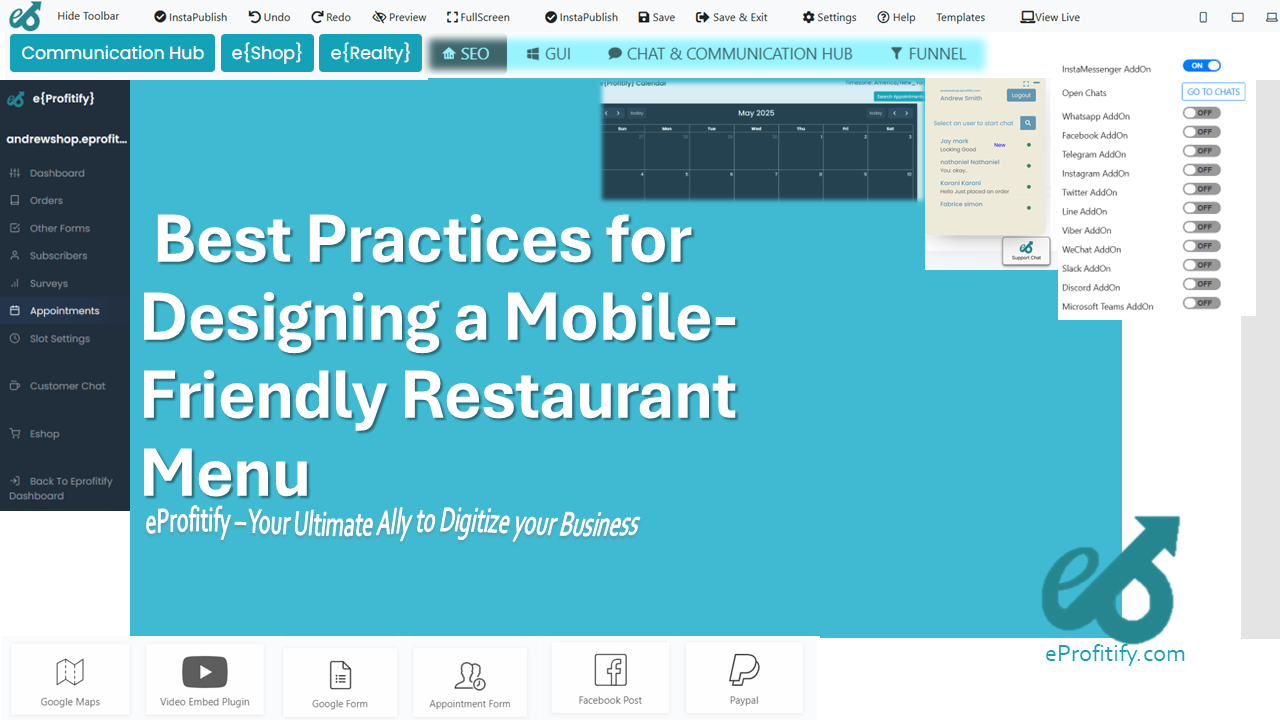How Food Trucks Are Becoming More Eco-Friendly with Technology

Schedule a LIVE Zoom call with an eProfitify Expert.
How Food Trucks Are Becoming More Eco-Friendly with Technology
The food truck industry, thriving with a 6.3% compound annual growth rate from 2017–2022 (IBISWorld), is no longer just about serving tacos and grilled cheese on the go. Today, it’s at the forefront of sustainability, driven by consumer demand and innovative technology. Eco-conscious customers increasingly prioritize businesses that minimize waste, reduce carbon footprints, and embrace ethical practices. From solar-powered kitchens to AI-driven logistics, food trucks are redefining street food with greener solutions. Here’s a look at how technology is transforming this sector—and how platforms like eProfitify are empowering operators to streamline eco-friendly operations.
1. Harnessing Renewable Energy
Many food trucks now integrate solar panels and battery systems to replace diesel generators, slashing emissions. A 2023 survey found that 60% of U.S. food truck operators are investing in solar energy, reducing reliance on fossil fuels. For example, solar-powered trucks can cut energy costs by 40% annually while eliminating noise pollution. Batteries store excess energy, ensuring operations continue during cloudy days—a win for the planet and profit margins.
2. Energy-Efficient Appliances
High-efficiency fryers, induction cooktops, and LED lighting are becoming staples. Energy Star-rated appliances use up to 30% less energy, saving operators $500–$1,000 yearly (Energy Star). LED lights further reduce energy use by 75% compared to incandescent bulbs. These upgrades not only lower carbon footprints but align with municipal regulations pushing for greener commercial practices nationwide.
3. Sustainable Packaging Innovations
Single-use plastics are out; compostable containers are in. A Technomic study revealed 45% of consumers prefer eateries with eco-friendly packaging. Brands like World Centric supply plant-based utensils and containers that decompose in weeks. Some trucks even offer discounts for customers returning packaging, fostering loyalty while diverting waste from landfills.
4. Smart Waste Reduction
Nearly 40% of U.S. food waste comes from foodservice (EPA), prompting trucks to adopt inventory management software. Apps like Leanpath track ingredient usage, helping chefs order precisely and repurpose leftovers. Composting partnerships are also rising, with 25% of operators now diverting organic waste to local farms (Green Restaurant Association).
5. Route Optimization & Delivery Apps
GPS and AI-driven route optimization tools, such as Routific, cut fuel consumption by 15% (McKinsey). Real-time tracking via DoorDash or Uber Eats minimizes idle time, reducing emissions. These platforms also boost sales—food trucks using delivery apps report a 20% revenue increase (Square).
6. Locally Sourced Ingredients
Farm-to-truck partnerships are flourishing, with 72% of operators prioritizing local sourcing (USDA). This reduces transportation emissions and supports regional economies. For instance, Austin’s The Peached Tortilla sources 90% of ingredients from Texas farms, slashing its supply chain carbon output by 50%.
7. Digital Tools: eProfitify’s Role in Sustainability
Managing a sustainable food truck requires seamless coordination. Enter eProfitify, a premier website-building and management platform tailored for small businesses. Its tools directly support eco-initiatives:
- Instant Messaging: Reduces paper flyers by managing promotions digitally.
- Appointment Management: Optimizes schedules to decrease idle engine time.
- Ecommerce Integration: Allows pre-orders, minimizing over-preparation and waste.
- CRM Systems: Tracks customer preferences to forecast demand, aligning inventory with sales.
By consolidating operations online, eProfitify helps trucks cut paper use, streamline logistics, and engage customers sustainably.
8. Case Study: Green Eats Mobile Kitchen
Green Eats, a Los Angeles vegan truck, uses eProfitify to manage orders and customer data. Pre-orders via its ecommerce portal reduced food waste by 30%, while CRM insights optimized inventory. Solar panels and route planning tools further lowered emissions by 25% in six months.
9. The Road Ahead
Emerging tech like electric truck chassis and AI-enabled compost systems promise to deepen sustainability. Programs like California’s Mobile Food-Friendly Solar Initiative offer grants for eco-upgrades, signaling regulatory support.
10. Conclusion
Technology is revolutionizing food trucks, making them key players in the green economy. From solar energy to digital platforms like eProfitify, innovation drives both environmental and business success. As consumers and governments prioritize sustainability, tech-savvy food trucks are poised to lead—one eco-friendly bite at a time.
By adopting these advancements, food trucks aren’t just serving meals—they’re serving the planet.








